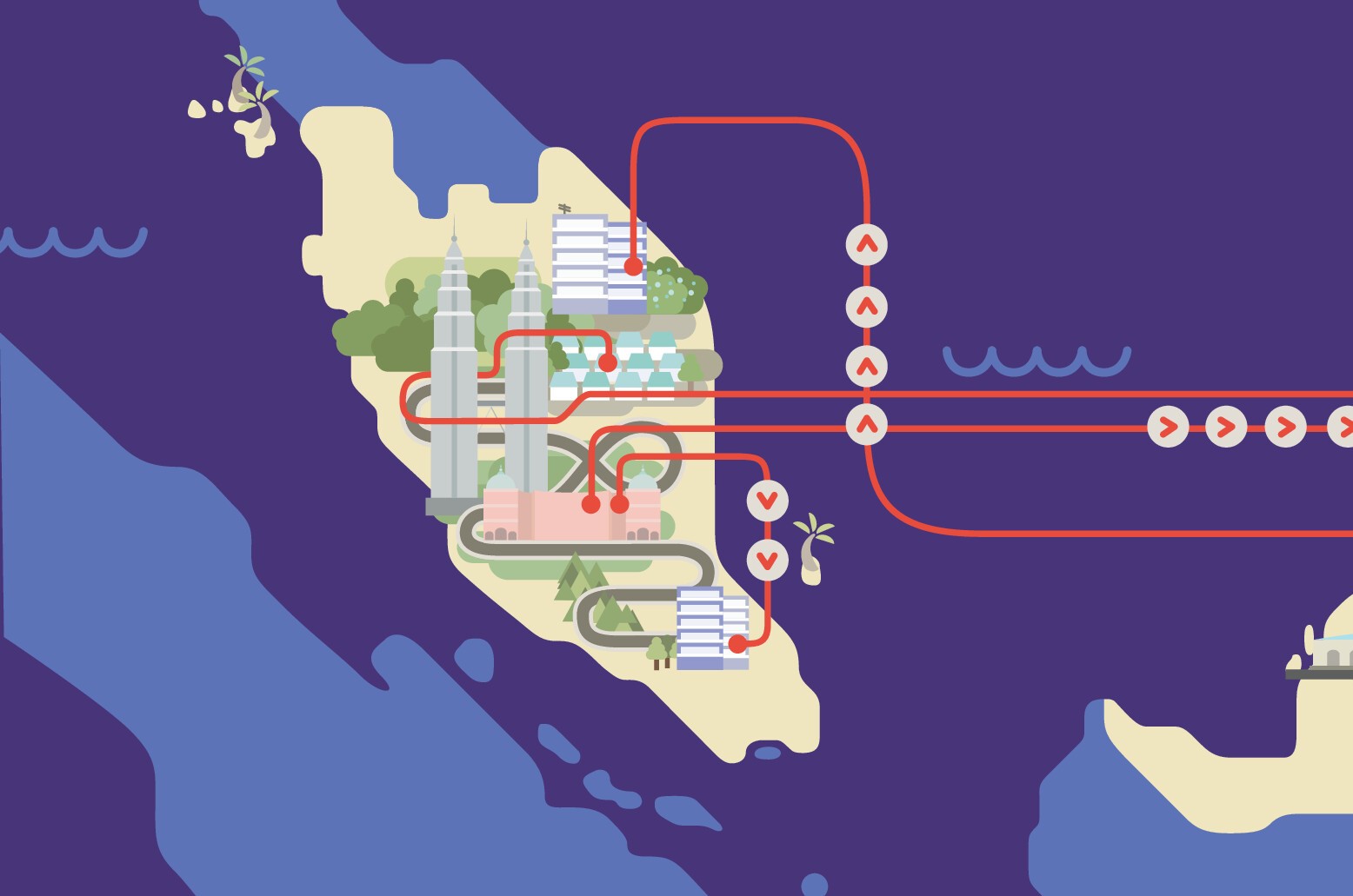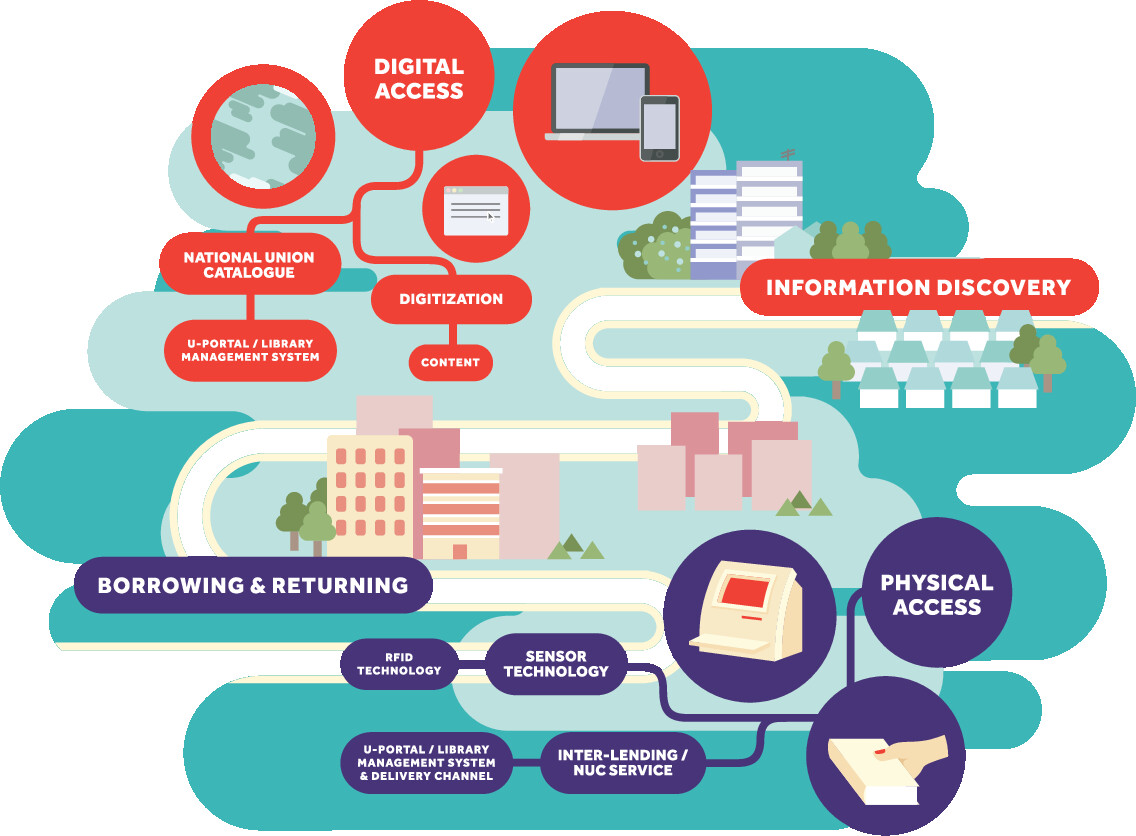u Pustaka: The Malaysian Ubiquitous Library Pilot Project
In pursuit of a knowledge-based society, the National Library of Malaysia has embarked on an ambitious project to connect all its libraries. The first step toward this vision is u-Pustaka, a pilot project changing the way information is accessed.

The vast reservoir of knowledge resources readily available in libraries is a treasure trove waiting to be discovered and used. Its easy accessibility to the public is crucial in the pursuit of lifelong learning as well as in supporting Malaysia’s quest to become a knowledge-based society. People of all ages and social backgrounds have a soft spot and affinity for libraries. This opens up opportunities for the introduction of new services by leveraging on the rapid advances in information and communications technology and the internet.
The Malaysian Ubiquitous Library Pilot Project, u-Pustaka, is a collaboration between eight libraries. It was spearheaded by the Malaysian Communications and Multimedia Commission (MCMC) as a project under the National Broadband Initiative. Its foundation and concept was based on recommendation 54 of the Knowledge-Based Economy Master Plan: “Review and enhance the role and contributions of museums, libraries and think tanks in lifelong learning to provide resources for learning and should be made more accessible to the majority of citizens.” Hence, the project aims to serve the public by delivering innovative library services to every household anytime and anywhere via broadband and other state-of-the-art technology.
The Team
u-Pustaka is an innovative and fitting culmination of the effort, collaboration and synergy by the Ministry of Information Communications and Culture through the MCMC, supported by the National Library of Malaysia together with the u-Pustaka Consortium members. The latter comprises the Selangor State Library Corporation, Negeri Sembilan State Library Corporation, Pahang State Library Corporation, Sarawak State Library, Kuala Lumpur Library, INTAN Library at Bukit Kiara and the Sabah State Library.

Other government agencies and private institutions also contributed towards the success of the project by offering advice, guidance and sharing expertise during its implementation. These include the Malaysian Administrative Modernisation and Management Planning Unit, Economic Planning Unit, National Registration Department, Ministry of Home Affairs, National Centre of Excellence for Sensor Technology at Universiti Putra Malaysia, Pos Malaysia Berhad, Malaysian Electronic Clearing Corporation Sdn. Bhd., Bank Islam Malaysia Berhad and Touch ‘n Go Sdn Bhd.
Mission, Vision and Objectives
The mission of u-Pustaka is to foster an engaging lifelong learning experience for an inclusive knowledge-based society in the context of 1Malaysia. This is achieved with the provision of Ubiquitous Library Services (u-Library) in support of the National Broadband Initiative. The project ensures that the Malaysian knowledge-based society is engaged in the pursuit of lifelong learning anytime and anywhere. It also hopes to achieve continuous enhancements to the quality of work and life of Malaysians. The nation gains in terms of national capacity-building. Hence, the objectives of u-Pustaka are to make information accessible with the widening of broadband services, radio frequency identification (RFID) technology, portal technology and content. It is hoped to establish a library network ecosystem to foster collaboration through inter-lending services, delivery services, e-payment services and virtual access to web publishing, content management and collaboration in expanding our capacities to innovate and create knowledge for the dividend of the nation; to create, share and exchange knowledge to keep communities connected and promote lifelong learning.
Challenges
u-Pustaka is based on a model where seven components – broadband infrastructure, u-Pustaka Portal, National Union Catalogue, inter-lending, cashless payment, RFID and the delivery channel – are seamlessly integrated.
The eight libraries involved in the project utilise different library management systems (LMS). Thus, the solution has to address this scenario so that libraries in Malaysia do not have to purchase and install another system to accommodate the project. Compliance to standards such as ANSI/NISO Z39.50 and connectivity to the National Union Catalogue – a centralised database comprising over 7.2 million catalogue records from 100 contributing libraries hosted at the National Library of Malaysia – is a major requirement for the project.
Participating libraries had to agree on new policies and guidelines pertaining to matters such as membership, circulation, delivery mechanism and electronic payment. The membership component leverages on MyKad/MyKid/MyPR; the delivery mechanism is entrusted to Pos Malaysia, while cashless payment is handled by Touch ‘n Go and the Malaysian Electronic Payment System.
New equipment comprising RFID-tagging workstations, gantries, bookdrops, auto sorters and multipurpose kiosks have been installed, while RFID middleware has been deployed to ensure seamless integration with the existing LMS RFID-Ultra High Frequency (UHF) with spectrum release of 919-923 Mhz and Standard Interface Protocol – Version 2 (SIP2).
Implementation
The u-Pustaka Pilot Project took three years from its conceptualisation in 2008 to its launch in 2011. A project of this magnitude entailed many man-hours spent on initial studies, executive talks, readiness assessments, solicitating funds, concept trials and the tender process, all of which took place between 2008 and 2009. The project kicked off in 2010 with a focus on the U-Library System development, standard operating procedures workshops, system implementation as well as promotional and awareness programmes that were carried out until 2011.
The Portal
The launch of the u-Pustaka Project on 31 March 2011 ushered in an innovation in library services for Malaysian citizens. The u-Pustaka Portal (http://www.ulibrary.gov.my) is the centrepiece of the project. Being the gateway to services and knowledge, the portal is interactive and user-friendly, providing users with an engaging learning and social experience in their pursuit of lifelong learning. Access to services and content is available in both Bahasa Malaysia and English.

Since u-Pustaka is a ubiquitous virtual library, fast, efficient and reliable service delivery for the public is of paramount importance. The portal is made up of four major components: inter-lending services, web publishing, content management and collaboration. A lot of thought went into designing the system so as to encourage the public to borrow and return books from any of the eight member libraries easily and at their convenience. Members have the choice of having books delivered right to their doorsteps, returning books at the nearest participating library, and engaging in online learning and knowledge sharing anytime as transactions are carried out 24/7 via the portal.
One of the unique features of u-Pustaka is the inter-lending services where the lending collections of the eight participating libraries are made available to u-Pustaka members. In a nutshell, the process of borrowing and returning books is as follows:
-
Users sign up to be a member via the u-Pustaka Portal. Membership is free of charge.
-
Users can search for a book or read reviews to help them find a book they like.
-
The availability of the book from participating consortium members and the book’s borrowing status will be displayed.
-
Members can opt to have the book posted by e-parcel or courier through Pos Malaysia.
-
Payment can then be made either through the Malaysian Electronic Payment System or Touch ‘n Go.
-
Books can be returned via u-Pustaka bookdrops located at participating libraries or via the e-parcel service where the books will be collected from their homes.

The u-Pustaka Consortium brings knowledge to life via web publishing components by publishing background information, media releases, speeches, information and policies, fact sheets, statistics, top bestsellers, links, RSS and electronic resources, among others.
The content management components provide information specifically for u-Pustaka members in the form of e-reviews, e-resources, audiobooks and dashboard for three segments of membership (adult, youth and children).
As the tagline “Think Knowledge, Think u-Pustaka” implies, a wealth of information and knowledge awaits seekers of knowledge everywhere, beckoning them to visit the u-Pustaka Portal that can be accessed from anywhere and at anytime via the internet.
The Way Forward
Since its launch on 31 March 2011, public response to the project has been positive and there are now more than 327,000 u-Pustaka members. The portal has been visited by users from more than 100 other countries such as the United States, Australia, the United Kingdom, Germany, Russia, Brazil and Saudi Arabia; and more than 11,000 transactions of books have been circulated via inter-lending. These numbers are expected to rise as the awareness of u-Pustaka increases when more publicity, promotional activities and user awareness programmes are rolled out.
The u-Pustaka pilot project currently involves the participation of just eight libraries, a very small fraction of the over 12,000 public, village, academic, school and special libraries in Malaysia. In the quest to be truly ubiquitous, u-Pustaka services must be extended to many more libraries in Malaysia. Synergy among all these libraries is crucial for the success of u-Pustaka and the realisation of its vision of a knowledge-based Malaysia that is engaged in the pursuit of lifelong learning anytime and anywhere for the continuous enhancement to quality of work and life as well as the betterment of society and the nation.
Dato’ Raslin bin Abu Bakar is the director-general of the National Library of Malaysia. He is on the International Advisory Board for WLIC IFLA 2013 and is a CONSAL executive board member. He was conferred the title Dato’ by His Royal Highness, Sultan of Pahang in October 2009 for his contributions to society.
REFERENCES
Library books sent to your doorstep. (2012, January 25). The Sun, p. 8. Retrieved from The Sun website.
Indahsah Haji Sdiek. (2010, January). Ubiquitous library: Strategizing information delivery services to connect communities in a knowledge society. MyConvergence, 4 (1), 43–49.
Indahsah Haji Sidek. (2011, January 25). U-Library: From idea to reality. U-Library: Extending beyond traditional boundaries [Seminar]. Cyberjaya, Selangor.
u-Pustaka Portal. Accessed at https://www.u-library.gov.my/.

